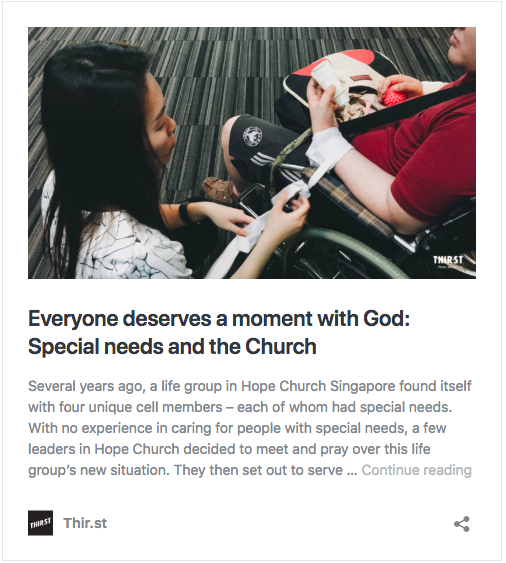This is a response piece to The Christian stereotype: Why you should also love those who aren’t like you.
I’m sure most of us know the weight of the word when someone is branded an apostate, but what comes to our mind when we picture such a person?
Perhaps, someone who wanders between worldviews pertaining to spirituality? Or a person who actively oppresses the Church? Such individuals undoubtedly exist, but have we considered the reasons why they went down such a path?
I know of an acquaintance named Yong Woon* with special needs like myself who had burnt bridges within my Church community after nearly two decades of hardship, passing through the Children’s, Youth and Young Adults Ministry.
His difficulties with relating and socialising with others around him caused him much pain and trauma within his school, where he was physically bullied and ostracised by classmates. Yong Woon told me about his struggles in Church and how it was no better than any other place, given his frequent meltdowns and conflicts with fellow peers and ministry staff.
Home too, provided little refuge as his parents and elder sister lacked in empathy for him, even though he was officially diagnosed to have an Autism Spectrum Disorder 2 years ago at age 25, after two previous acts of self-harm.
If we genuinely love our neighbours, we must therefore make the effort to see past our divides
Although he served in the Special Needs Ministry for a time, his external commitments with Work Shadowing and performances with The Purple Symphony resulted in conflicts of interest with his fellow workers.
Ultimately, Yong Woon severed ties with the members in my Church.
He confided in me that it wasn’t the first time he has done so: He had written letters of resignation written to ministry workers from both the Youth and Young Adults congregation before to air his grievances. Those letters were frowned upon by my Church elders, who found his actions maladjusted and immature.

As a person with Asperger’s Syndrome myself, I’ve also have had my fair share of similar problems within my Church in my younger years. Ultimately, I made a painful but necessary transition to the Senior Citizen’s congregation after a bad departure from the Youth Ministry.
It is curious how such experiences leave you in a “dipolar” state, the two D’s being disdain and discouragement. When I saw how Yong Woon left the faith, I started to think about the message Jesus spoke to his disciples regarding the conflict between the world and the Church owing to the world’s rejection of Christ (John 15 :18-21).
Certainly, one who does not obey God will never fully receive and serve the community of His people. But what if it were the other way round?
Often, the interpersonal hurt caused directly to individuals within the Church is even more grievous than regular public scandals and shaming brought to light by outsiders. It is a painful thing to experience neglect or be wronged by other believers – your very own blood-bought brothers and sisters.
Favouritism and segregation are condemned (James 2:1-13).
Of the seven deadly sins, the source from which discord and strife arises among the Body of Christ is vanity. To treat others poorer in appearance/means/capacity/faith with contempt or hostility within the Church breeds discontentment and even resentment among ourselves.
It’s decried as sin in the letter of James, for what truly matters to the Bride of Christ is to conform in the character of Christ Himself. Favouritism and segregation are condemned (James 2:1-13).
No doubt, this is difficult when people are polar opposites from what we expect them to be. Yet, the Church must be beacon of hope to those suffering in the world — these sufferers are closer to us within our own community than we think.
If we genuinely love our neighbours, we must therefore make the effort to see past our divides — of colour, tongue, creed and others —to nurture and support each other as the family of our Lord (1 Corinthians 13).

On a final note, it is my hope that Yong Woon will find the courage and forgiveness to come back to the faith and reconcile with my Church eventually.
To my brethren who have been downtrodden or even actively hurt within your Church community, the aforementioned two D’s are inevitable in the sinful fallenness of creation from which the Church is not spared.
The Church is made from deformed people, and yet Christ in His great love has never abandoned it. Do seek advice from trusted peers, mentors and ministry leaders or professional counselling if necessary in your life’s circumstances, but I urge you not to cause the two D’s to end in another — divorce.
… call upon Him to heal and mend the ties in the family you’ve been called to be a part of.
A life divorced from faith will ultimately be one not worth living. We need the Church and we need fellowship; we cannot expect to stand alone when facing the perils that the flesh, the world and Satan send our way. Likewise, the Church needs us in a symbiotic relationship to use our talents and skills to raise disciples among all peoples.
Whatever the circumstance, hold on to hope. The only hope for salvation we have is in our Lord and no other. Your faith belongs to you. Like a marital covenant, it is a vow made between you and God, a divine gift that no one, not even your enemies, can steal from you — unless you let them.
You may choose to abandon the gift of salvation by running away from the Church … Or you can call upon Him to heal and mend the ties in the family you’ve been called to be a part of.
You can run the race with fervour, towards an eternity yet to come.
*Name has been changed for confidentiality.









